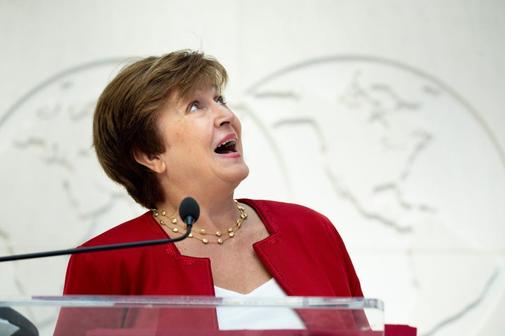The world economy has entered a phase of "synchronized deceleration" as a consequence in part of the paralysis of trade due to trade tensions, whose cumulative impact on the world economy could mean the loss of 700 billion dollars (637,000 million euros ) in 2020, as warned by the new managing director of the International Monetary Fund (IMF), Kristalina Georgieva , who has indicated that a major deterioration of the planned activity may make necessary "a coordinated fiscal response".
In his intervention prior to the annual meeting that the international organization will hold in Washington during the next week, Georgieva stressed that currently a growth slowdown is expected in 90% of the world, a phenomenon for which he has coined the expression "synchronized deceleration" as opposed to the "synchronized boom" two years ago, when 75% of the world economy expanded.
"This general slowdown means that growth will fall this year at its lowest rate since the beginning of the decade, " said the director of the IMF, which will announce its new economic outlook next week, anticipating that these will show downward revisions for 2019 and 2020.
Among the causes of this widespread loss of economic momentum, the Bulgarian has warned that the growth of world trade "has practically stalled" as a result of trade tensions, which has caused the substantial deterioration of manufacturing and investment, with the risk that services and consumption also end up being affected.
In fact, the IMF director believes that, even when growth rebounds in 2020, the current cracks could cause changes that last an entire generation, including the breakdown of supply chains, the compartmentalization of commercial sectors and a "digital Berlin wall "to force countries to choose between technological systems.
In this sense, Georgieva has warned that "in a trade war, everyone loses" and has advanced that the IMF estimates suggest that the cumulative effect of trade conflicts for the world economy "could mean a loss of some 700,000 million dollars by 2020 ", about 0.8% of GDP.
"This is approximately the size of the entire economy of Switzerland," he added.
SYNCHRONIZED TAX RESPONSE.
In its analysis, Georgieva has made it clear that monetary and financial policies cannot respond by themselves to a worsening economic situation before which fiscal policies should play a central role, taking advantage of the space generated by low interest rates .
In this regard, he has claimed that those countries, such as Germany, South Korea or the Netherlands, which have budgetary margin, undertake an increase in public spending, especially in infrastructure and R&D, to boost demand and growth, while fiscal moderation is justified in countries with a high debt / GDP ratio.
"If the deceleration of the world economy is more pronounced than expected, a coordinated fiscal response may be necessary (...) Or, in other words, if the synchronized deceleration worsens, we may have to give an economic policy response synchronized, "Georgieva has recommended, recalling the effectiveness of this approach in the G20 commitment in 2009 to make a joint stimulus.
STRUCTURAL REFORMS AND ENVIRONMENTAL TAXES.
The new director of the IMF has put back on the table some of the old recipes of the institution to boost growth, including the need to undertake structural reforms that increase productivity.
"The loss of jobs due to automation and demographic changes requires countries to reform the structure of their economies," said the Bulgarian, for whom if they do not act now, many countries will be stuck in a "growth mediocre".
Also, Georgieva has pointed out that climate change represents a crisis to which no one is immune and over which we all have the responsibility to act.
In this sense, the IMF considers that carbon taxes can be one of the most powerful and efficient tools, although it has stressed that the key is to modify tax systems, and not simply to establish a new tax.
In this way, the additional collection could be used to cut other taxes and finance assistance to the millions of households affected. In addition, these new resources could also support investments in clean energy infrastructure.
"Crossing your arms is too expensive," Georgieva concluded, for whom it is time to cooperate in the face of this challenge and work together to instill renewed confidence in multilateralism.
According to the criteria of The Trust Project
Know more- IMF
- GDP
- Germany
- South Korea
Interview Antonio Bonet: "Our competitiveness gain is based on the salary reduction and is not sustainable"
Basque CountryAdegi is confident that employment will also continue to grow in 2020 despite economic uncertainties
Financial stress The IMF retains 5,400 million and freezes its relationship with Argentina on the first day with Georgieva in charge

